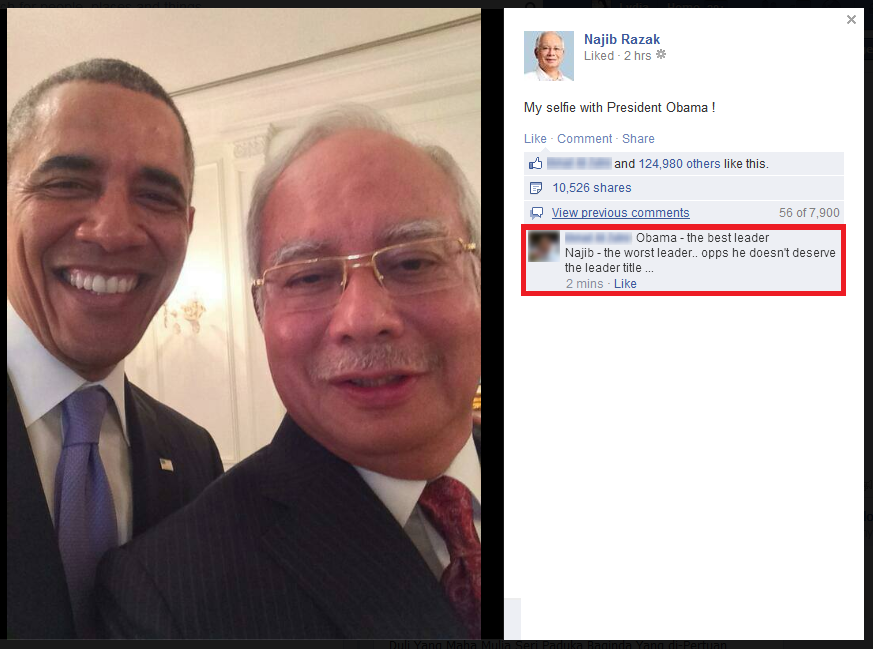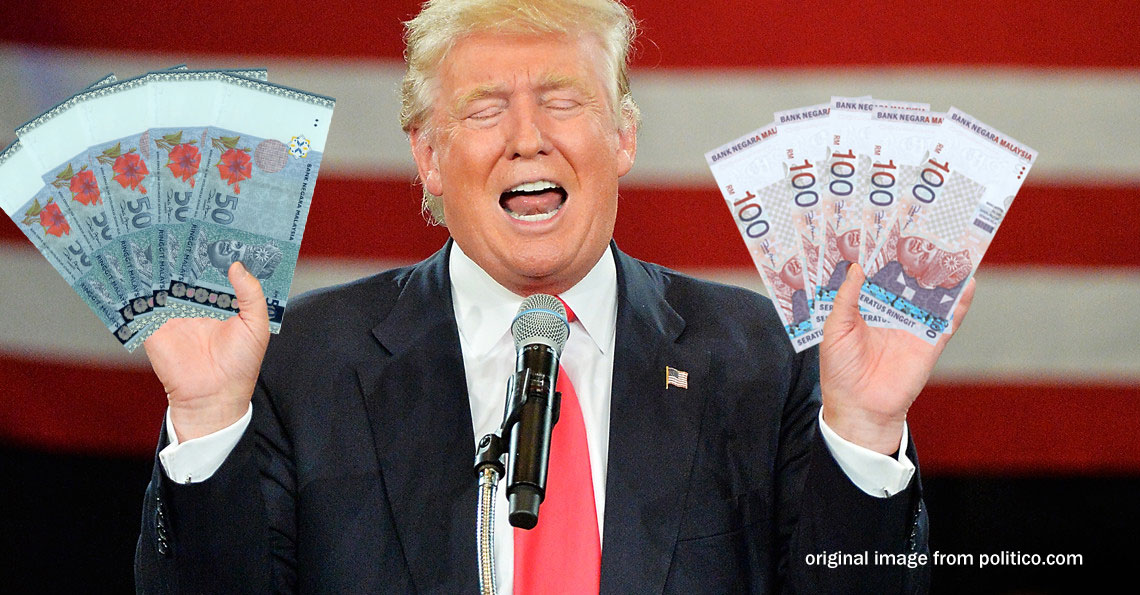OI! Is Malaysia really selling its future away to America?!!
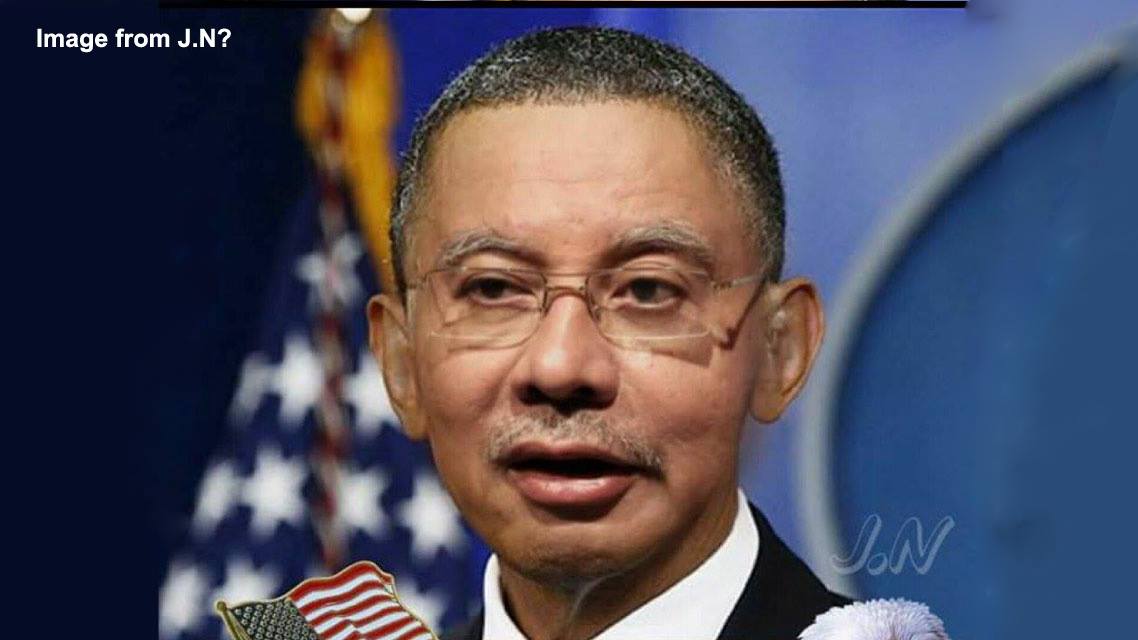
- 1.3KShares
- Facebook1.3K
- Twitter1
- Email2
Over the past few years, President Obama and PM Najib seem to be BFFs, with the golf games and selfies. But with Obama’s visit last week, it’s been confirmed that the two become one:
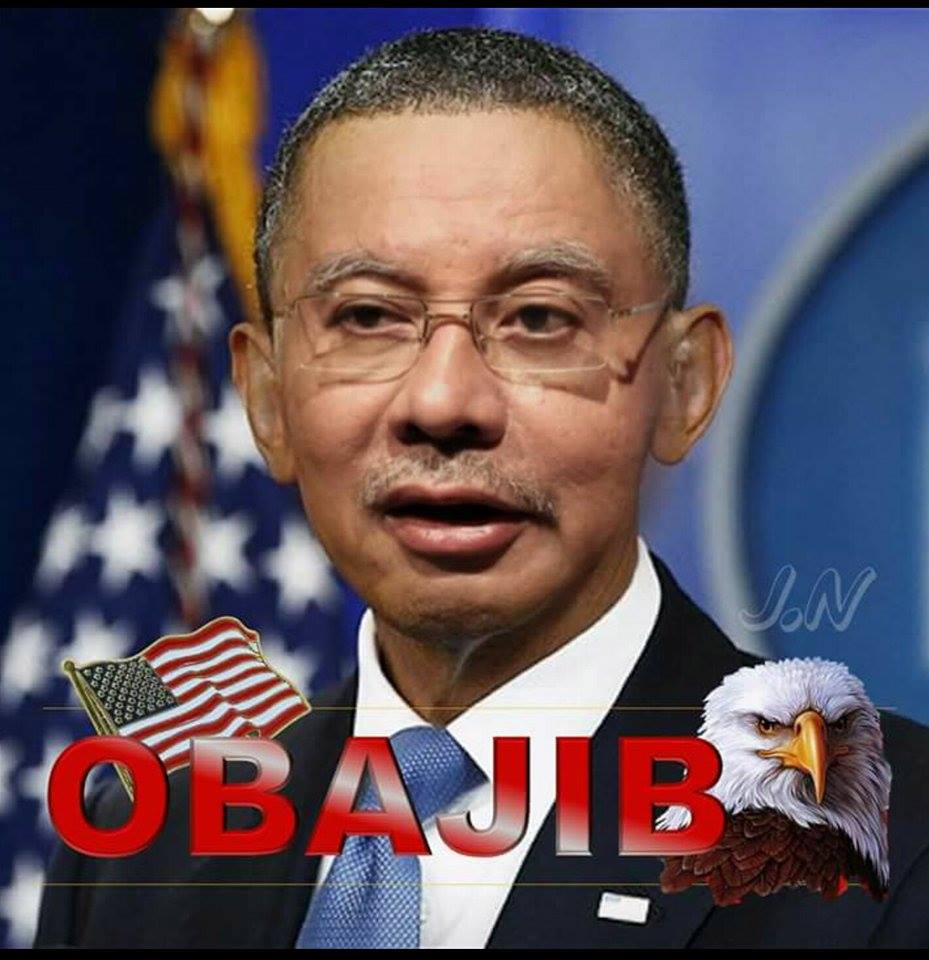
We are of course referring to Malaysia being a part of the TPP.
At this point, we expect 50% of ugaiz to be asking “Apatu?”, 30% to think our country is doomed, and 20% to be thinking about Toilet Paper. But that’s just our guesstimate – what do you think about the TPP?
[interaction id=”564d550eb8db3ddc5e443f6a”]
Very briefly, the TPP is a highly controversial trade agreement between the US and 11 other countries, including Malaysia. And, according to many in the Doom category, it’s also the scariest thing you’ve NEVER heard of. And we really don’t blame you if you don’t know about it.
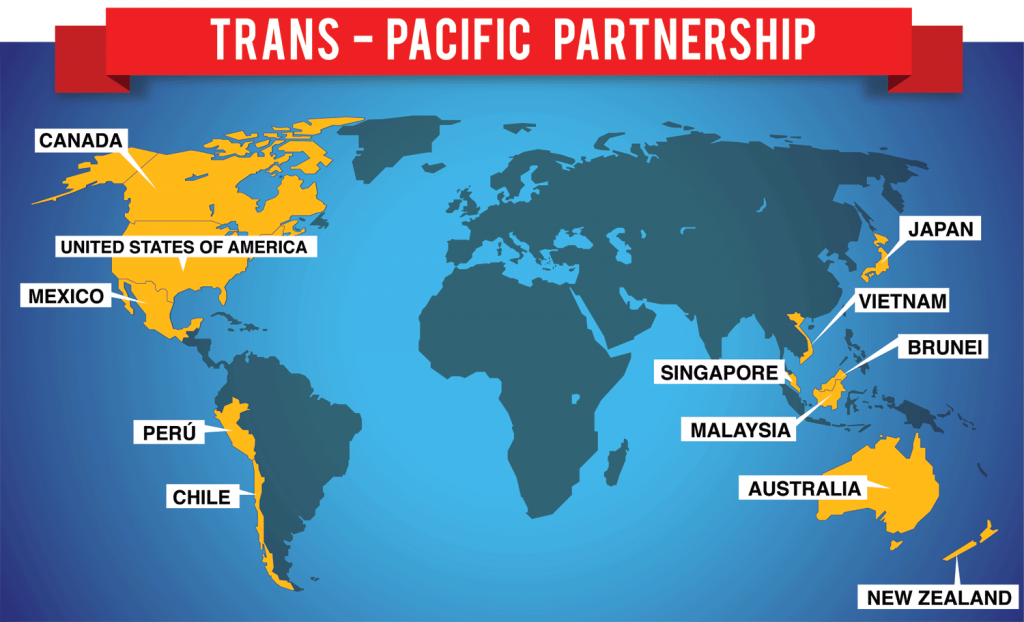
This is because details of the Trans Pacific Partnership agreement – which is why it’s sometimes also called TPPA – was shrouded in secrecy to the point that even American Senators (something like our MPs) weren’t allowed to view it. Everyone else only got to see the documents on two occasions – when Wikileaks leaked the draft online (this is important), and when the finalized proposal was released earlier this month.
So what’s the TPPA about? Gimme details!!!
Uhm… we had a look at the released documents on the Malaysian Ministry of International Trade and Industry (MITI)’s website and, well…
THE DOCUMENT IS OVER 2,000 PAGES LONG WTFBBQTPPA!!

Yeah, it actually covers a whole bunch of things, not just on trade, but also on issues of government transparency, administration, agriculture, investor security, and a whole bunch of other things that will make your brain want to eat itself. What makes it even more complicated is that each country has its own conditions and restrictions that every other member country has to agree to.
In other words, we’re not gonna go into details of the agreement because there’s no way we can brain something like this, or even discuss everything in detail. In fact, I’m the SECOND writer to take this subject. Our first writer (a freelancer) actually gave up halfway and disappeared. We’re still trying to contact him.

So if you want more details on the TPP, you can read it yourself here and help explain to us after pls.
Instead we’re gonna address some of the RUMORS of the horrible things that Malaysians are going to experience once the TPP is signed in January:
- Medicines will become a lot more expensive.
- Local businesses will koyak because they won’t be able to compete with foreign companies.
- Bumiputera businesses will no longer get protection or preference.
- Malaysia will be kowtowing to corporations cause now companies can sue the gomen.
- Sharing or owning copyrighted content will get you in super big trouble.
- Malaysia’s human rights issues are going to be ignored from now on.
And these are only the big issues people privvy to the TPPA are discussing in Malaysia and internationally.But how true are they? You may be surprised, given how some of our articles sound like we’re opposed to the government, but…
It might not actually be all that bad!
Straight up, in all total honesty, when we first started looking into the TPP a few months ago it sounded really, really scarily bad. And even after the final version was released, we still couldn’t tell cause, 2000 pages lol. This is where we started looking for outside help.
After many conversations with people who have been studying the TPP, this writer at least has come to the conclusion that it’s not that bad. We spoke to several people on this – the nice people at Sinar Project, Wan Saiful Wan Jan from IDEAS, Kenny Loh, and Diyana Yahaya (who pointed out many concerns regarding the TPPA); and attended a presentation/Q&A with Burhan Irwan Cheong, one of the lead TPPA negotiators at the Ministry of Domestic Trade.
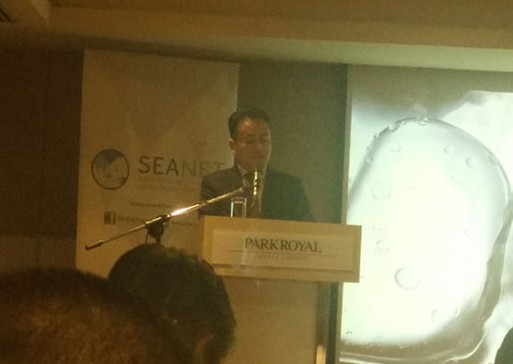
If there was one point we can take away from Burhan and Wan Saiful, it’s that a lot of the fears about TPPA came from misconceptions caused by reading early leaked drafts of the agreement. Burhan stressed that a lot has changed over the course of the negotiations and Malaysia has added enough safeguards (that the other 11 countries agreed to) in order to protect our own interests.
So let’s take another look at some of the fears expressed earlier…
1. “No more Bumi business contracts!!!”
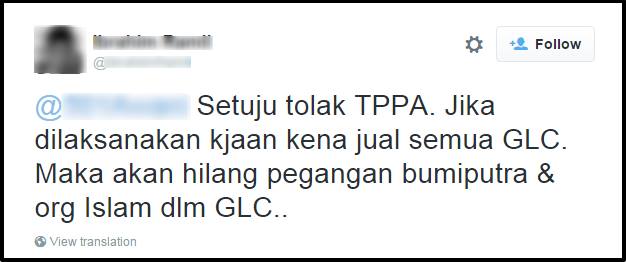
The issue of preference towards giving government and government-linked contracts to Bumiputera companies has long been a subject of debate. So when the Americans came in with their free-for-all open market ideas with the TPP, pro-Malay groups flew into an outrage saying it was threatening the Bumiputera Agenda.

But here’s the good news! Bumi contracts are here to stay! And here’s the section of the TPPA that talks about it! You go read yourself!
The TPP has allowed certain exemptions to “all state-owned enterprises and designated monopolies” such as Petronas, FELDA, and development banks to continue placing preference on Bumiputra companies when it comes to awarding contracts. But here’s where it gets interesting – some of these exemptions will gradually decrease over time. Petronas for example will have to lower their Bumiputera-friendly budget allocation from 70% to 40% over the course of six years.
It gets even more interesting with government contracts too. The gomen is now limited to only awarding a certain percentage of contracts to Bumiputera companies based on the value of the contract (page 17 of this link), with everything else being an open bid to local and international companies.
Wan Saiful also pointed out another side advantage to this system: Transparency. Because now all these contracts will have to be publicly announced (most likely on the internet) so we’ll know exactly which are given preferential treatment and which are not. Can we say the same thing now?
2. “Medicines will become more expensive!!!”
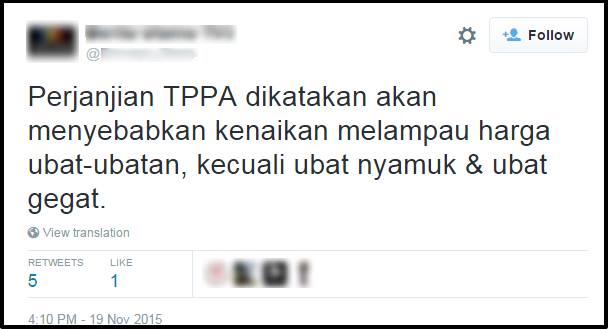

Burhan mentioned that this is the most-asked question by the public concerning TPP. So first things first, the reasoning for this isn’t that the TTP will cause prices of medicines to go up, but rather it will allow pharmaceutical companies to monopolize a particular treatment via patent protection, preventing other companies from creating cheaper substitutes (known as “Generics”). A patent is sortakinda like a prize for being the first to invent something, the prize being a guarantee that no one else would be able to make or sell it for 20 years. As an example:
Pfizer created Viagra, a drug that allows a man’s lazy soldier to stand at attention (you know what we mean). For 20 years, Pfizer is the ONLY company that can sell this happyhappyboomboom pill, allowing them to set prices that you have no choice but to pay for if you want to use it – basically a monopoly.
Now imagine if this wasn’t a drug that you have to take to free your willy, but to save your life… which is the case for a lot of patented treatments out there. It’d be pretty hard on your wallet unless there were cheaper options available. Burhan happens to be the lead negotiator for this field (Intellectual Property) and he says that patent extension (heehee) isn’t that big a deal.
The only major condition the TPP makes is that a country MUST extend a patent if it takes too long to approve it. Burhan says that this can be overcome though efficiency, and our National Pharmacy Control Bureau is pretty darn efficient. We process pharmaceutical patents faster than Japan, Australia, and Singapore – taking less than a year on average. What this means is that while there’s a possibility for patents to be extended, the likelihood of that happening is pretty low.
Just as an additional point to show how much conditions in the TPP has changed, all information related to a patent such as research and ingredients are usually made available for others to see and conduct their own research. The TPP initially wanted to keep this info private for 12 years before it was negotiated down to five.
3. “Cannot download games and movies anymore!!!”
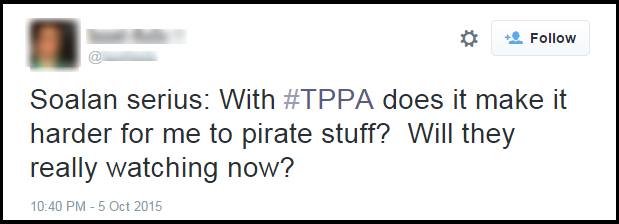
Just to put it out there, Malaysia already has laws in place to combat illegal downloads of copyrighted content. There have already been blocks on many filesharing sites and people have actually been arrested. So legally speaking, you shouldn’t be downloading in the first place 🙄
In our conversation with Sze Ming from Sinar Project, what you should actually be worried about is that the TPP may open the door to super-strict copyright laws like the Digital Millennium Copyright Act (DMCA) used in the US that would force governments to crack down on many things that you take for granted. For example, if you own a small business like a cafe and play music to your customers off your iPhone, you might be sued. Speaking of iPhone, you can also get sued for jailbreaking an iPad (but iPhone can). But again, this is just a maybe… for now.
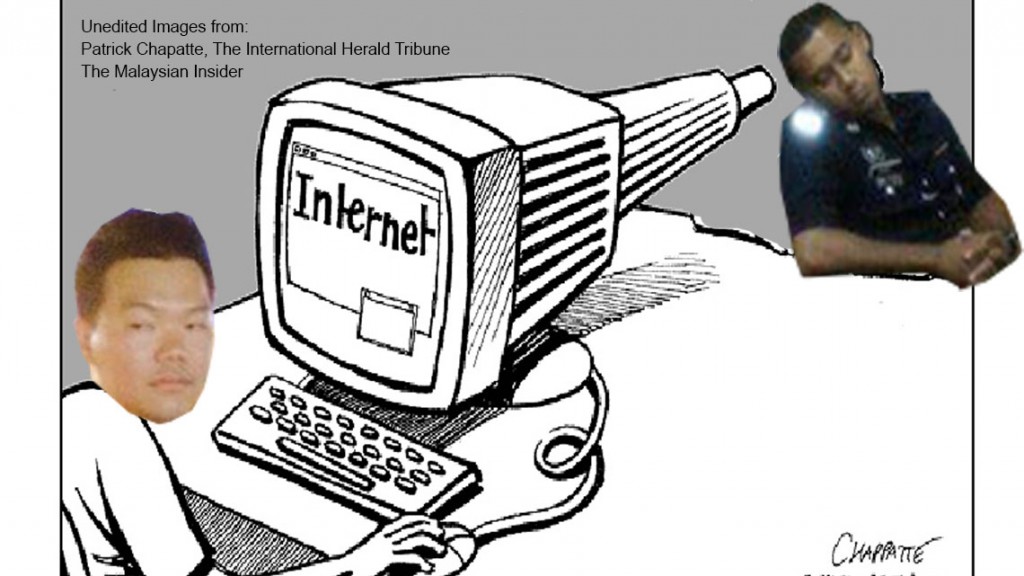
What’s certain though, is that Internet Service Providers (ISP)- TM for most of us – will be required to monitor and report the sharing of illegal files so this pretty much gives ISPs the green light to legally spy on your online activities. Also governments may now have more avenues to rampas your electronic devices
But we’re talking about the sorta-bright sides of TPP, so…um…you probably won’t have to download anymore because paid streaming services like Netflix and Hulu Plus might be making their way here thanks to the TPP? Heh.
4. “Malaysian companies won’t be competitive anymore!”
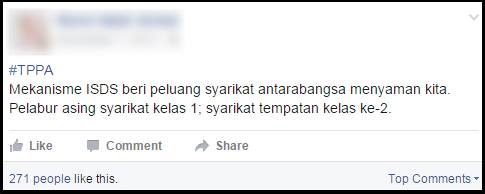
A survey conducted in October this year showed that only 40% of businesses believed that the TPP would benefit the Malaysian economy. This is mostly due to the belief that the removal of tariffs – taxes on products being imported – would cause Malaysian-made products to be less competitive compared to cheaper foreign imports. Here’s Malaysia’s tariff list if you wanna have a look.
But you know what else is at 40%? The amount of Foreign Direct Investment (FDI) Malaysia has lost in the first half of 2015 alone compared to the first half of 2014. There are a number of reasons for this, but investors aren’t too confident in our country right now to be dumping money into it.
Being a trade agreement, the TPP effectively opens up avenues for FDI not just for foreign companies into Malaysia, but for Malaysian companies overseas as well. This is also true for imports… there’ll be less tax for many imported products from member countries, but Malaysian-made goods will also be taxed less when they get exported. So in theory, by signing the TPP, Malaysia has opened itself to a USD$27.5 trillion market and an increased income of US$26.3 billion by 2025.
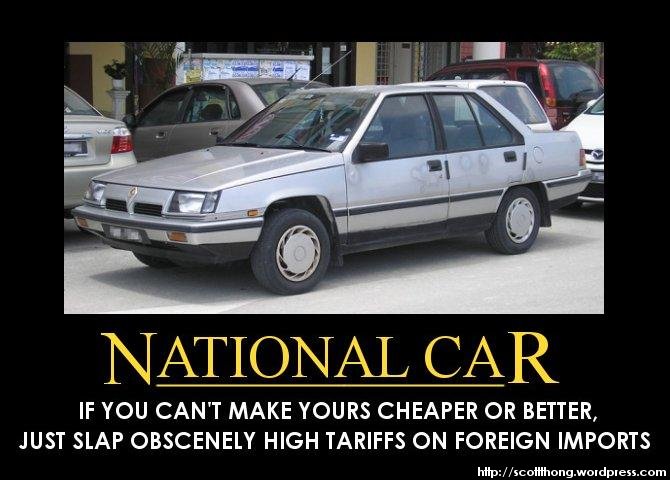
So if anything, it might be a lack of competitiveness and innovation that’s the problem. And this is something that we think might be due to being protected by high tariffs for so long. The best argument of this is Proton, where high tariffs placed on foreign cars make Proton the best option for many Malaysians not because it’s better, but because it’s cheaper. When tariffs were reduced following the ASEAN agreement, Proton’s sales fell as foreign cars became cheaper – forcing Proton to innovate and make better cars in order for it to remain competitive.
A great example of this is Hong Kong, which is noted to be one of the world’s most open economies – particularly in the telecommunications industry. There are no monopolies (*coughTMcough*) and so companies are constantly evolving to to keep their customers. And with this, the end winner is the consumer because better technologies become available at cheaper prices.
5. “Malaysia will become a slave to American corporations!”
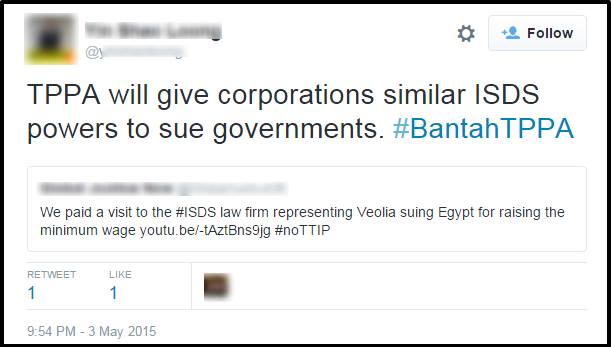
We’re sorry to do this to ugaiz, but we’re gonna introduce another technical term here – Investor-State Dispute Settlement (ISDS). To explain it very simply, the ISDS allows a company to sue a country in an international court. However, the ISDS is treaty-specific, meaning that it can only happen if a country is part of an agreement that allows for it – like the TPP.
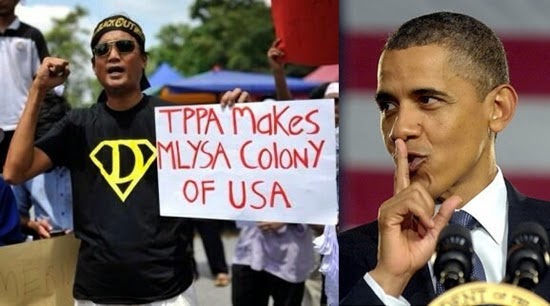
The ISDS raises concerns that Malaysia would risk losing its independence to make decisions if it has to worry about being sued by corporations. And this in turn might lead to some really bad outcomes related to the environment and public health. As an example,
If the Malaysian government suddenly decides that the Lynas plant in Kuantan is causing too much environmental damage and forces it to close down, Lynas could sue the Malaysian government for the loss of their investment.
Click on the next two links for some real-world examples of the use of ISDS against governments, and a recent lawsuit by a tobacco company against Australia.
But here’s the kicker – Malaysia is already a part of several agreements which the ISDS is in effect. And not just that Malaysia has been sued before, and Malaysian companies have also sued other countries! So in other words, we’re already liable to be sued under the ISDS whether or not we’re part of the TPP.
So should we still be afraid of the TPP?
Well, after making it this far into the article, have your opinions changed?
[interaction id=”56509145b8db3ddc5e56641c”]
Back in 1942, a movie called The Cat People revealed something interesting : Because a lack of budget prevented the actual monsters from being shown, audiences actually got more scared and even started imagining seeing the monsters in some scenes which were filmed in the dark. And so perhaps it was because everyone was kept in the dark about the TPP negotiations that led to the fears and misconceptions that have sprung up, not just in Malaysia but in every other member country- even within the US.
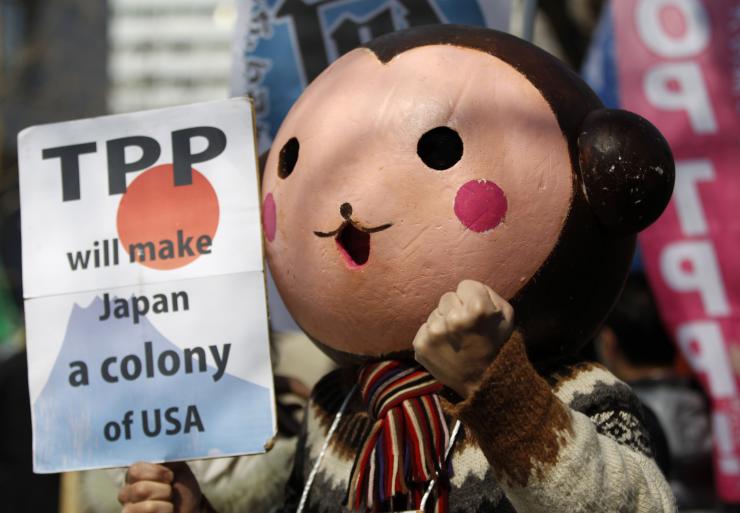
As a point to illustrate how confusing the TPP can be, when news of President Obama’s answer to a TPP question at Taylor’s Lakeside Campus on the 20th was published, two different news sources reported two different answers:
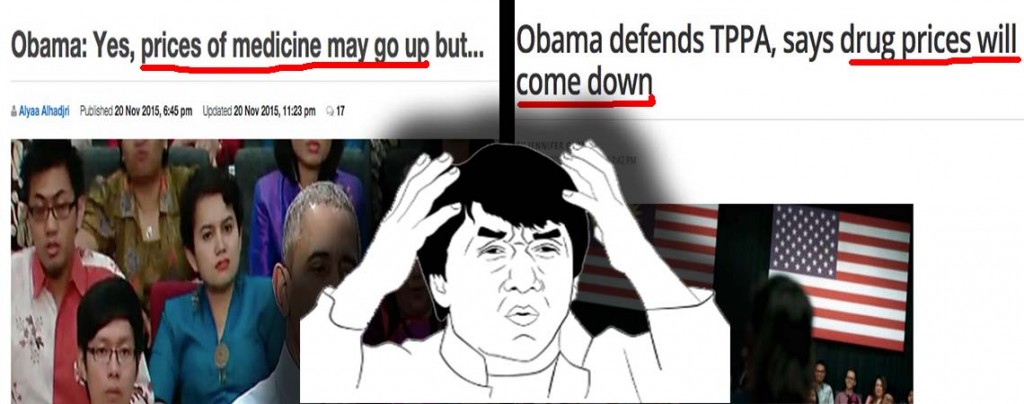
Here’s the linkto the Malaysiakini article, and to The Malaysian Insider one.
While it’s quite funny that this happened, we wonder how it would affect a reader’s perception depending on which article he or she reads. And really, it’s hard to even research this without coming across arguments based on the outdated wikileaks documents.
In other words, what we’re trying to say is that it’s hard to come up with a solid conclusion as to whether the TPP will be good or bad for us simply because of the differing sources of information out there. Heck, I’m not even sure if all my facts in this article is 100% correct #disclaimer. What I’m sure of, though, is that no matter which side you’re arguing on, both sides will end up making valid points. Right now it’s just a matter of whether or not the arguments are based on what we know from the final version of the TPP.
“…We have to open up some markets to goods that previously (were) subject to tariffs and somebody in our country will not like that … (but) we will be able to sell something to Malaysia and somebody in Malaysia won’t like that. … That’s the nature of negotiations in trade deals,” – President Obama, in his answer to a question at Taylor’s, as quoted by New Straits Times Online.
Yes, there will be changes to the things we’re used to, but the fact is that changes, whether social, economical, or environmental will happen whether we like it or not. If Malaysia wasn’t part of the original 12 TPP countries, it might need to be a part of it in the future. Isn’t it better that we be a part of it now when we can still have a voice in dictating the terms?
P.S.: We didn’t discuss the human rights issue because that’s a whole article by itself. You can check it out here.
- 1.3KShares
- Facebook1.3K
- Twitter1
- Email2


